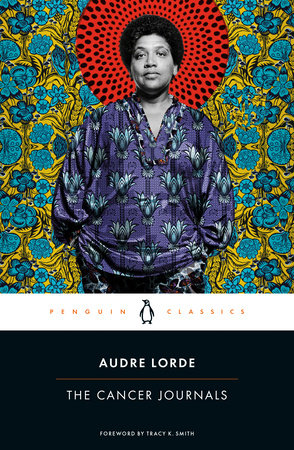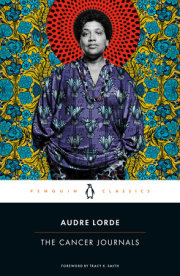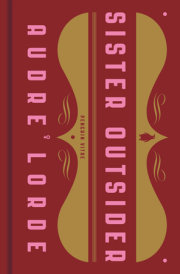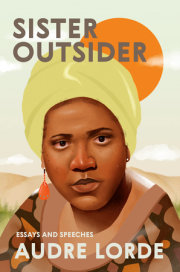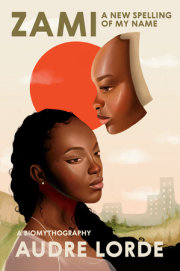I
The Transformation of Silence into Language and Action
I would like to preface my remarks on the transformation of silence into language and action with a poem. The title of it is "A Song for Many Movements" and this reading is dedicated to Winnie Mandela. Winnie Mandela is a South African freedom fighter who is in exile now somewhere in South Africa. She had been in prison and had been released and was picked up again after she spoke out against the recent jailing of Black school children who were singing freedom songs, and who were charged with public violence . . . "A Song for Many Movements":
Nobody wants to die on the way
caught between ghosts of whiteness
and the real water
none of us wanted to leave
our bones
on the way to salvation
three planets to the left
a century of light years ago
our spices are separate and particular
but our skins sing in complimentary keys
at a quarter to eight mean time
we were telling the same stories
over and over and over.
Broken down gods survive
in the crevasses and mudpots
of every beleaguered city
where it is obvious
there are too many bodies
to cart to the ovens
or gallows
and our uses have become
more important than our silence
after the fall
too many empty cases
of blood to bury or burn
there will be no body left
to listen
and our labor
has become more important
than our silence.
Our labor has become
more important
than our silence.
(from Audre Lorde's The Black Unicorn, W.W. Norton & Co., 1978)
I have come to believe over and over again that what is most important to me must be spoken, made verbal and shared, even at the risk of having it bruised or misunderstood. That the speaking profits me, beyond any other effect. I am standing here as a Black lesbian poet, and the meaning of all that waits upon the fact that I am still alive, and might not have been. Less than two months ago, I was told by two doctors, one female and one male, that I would have to have breast surgery, and that there was a 60 to 80 percent chance that the tumor was malignant. Between that telling and the actual surgery, there was a three week period of the agony of an involuntary reorganization of my entire life. The surgery was completed, and the growth was benign.
But within those three weeks, I was forced to look upon myself and my living with a harsh and urgent clarity that has left me still shaken but much stronger. This is a situation faced by many women, by some of you here today. Some of what I experienced during that time has helped elucidate for me much of what I feel concerning the transformation of silence into language and action.
In becoming forcibly and essentially aware of my mortality, and of what I wished and wanted for my life, however short it might be, priorities and omissions became strongly etched in a merciless light, and what I most regretted were my silences. Of what had I ever been afraid? To question or to speak as I believed could have meant pain, or death. But we all hurt in so many different ways, all the time, and pain will either change, or end. Death, on the other hand, is the final silence. And that might be coming quickly, now, without regard for whether I had ever spoken what needed to be said, or had only betrayed myself into small silences, while I planned someday to speak, or waited for someone else's words. And I began to recognize a source of power within myself that comes from the knowledge that while it is most desirable not to be afraid, learning to put fear into a perspective gave me great strength.
I was going to die, if not sooner then later, whether or not I had ever spoken myself. My silences had not protected me. Your silence will not protect you. But for every real word spoken, for every attempt I had ever made to speak those truths for which I am still seeking, I had ever made contact with other women while we examined the words to fit a world in which we all believed, bridging our differences. And it was the concern and caring of all those women which gave me strength and enabled me to scrutinize the essentials of my living.
The women who sustained me through that period were Black and white, old and young, lesbian, bisexual, and heterosexual, and we all shared a war against the tyrannies of silence. They all gave me a strength and concern without which I could not have survived intact. Within those weeks of acute fear came the knowledge-within the war we are all waging with the forces of death, subtle and otherwise, conscious or not-I am not only a casualty, I am also a warrior.
What are the words you do not yet have? What do you need to say? What are the tyrannies you swallow day by day and attempt to make your own, until you will sicken and die of them, still in silence? Perhaps for some of you here today, I am the face of one of your fears. Because I am woman, because I am Black, because I am lesbian, because I am myself, a Black woman warrior poet doing my work, come to ask you, are you doing yours?
And, of course, I am afraid-you can hear it in my voice-because the transformation of silence into language and action is an act of self-revelation and that always seems fraught with danger. But my daughter, when I told her of our topic and my difficulty with it, said, "Tell them about how youÕre never really a whole person if you remain silent, because thereÕs always that one little piece inside of you that wants to be spoken out, and if you keep ignoring it, it gets madder and madder and hotter and hotter, and if you don't speak it out one day it will just up and punch you in the mouth."
In the cause of silence, each one of us draws the face of her own fear-fear of contempt, of censure, or some judgment, or recognition, of challenge, of annihilation. But most of all, I think, we fear the very visibility without which we also cannot truly live. Within this country where racial difference creates a constant, if unspoken, distortion of vision, Black women have on one hand always been highly visible, and so, on the other hand, have been rendered invisible through the depersonalization of racism. Even within the women's movement, we have had to fight and still do, for that very visibility which also renders us most vulnerable, our Blackness. For to survive in the mouth of this dragon we call america, we have had to learn this first and most vital lesson-that we were never meant to survive. Not as human beings. And neither were most of you here today, Black or not. And that visibility which makes us most vulnerable is that which also is the source of our greatest strength. Because the machine will try to grind you into dust anyway, whether or not we speak. We can sit in our corners mute forever while our sisters and our selves are wasted, while our children are distorted and destroyed, while our earth is poisoned, we can sit in our safe corners mute as bottles, and we still will be no less afraid.
In my house this year we are celebrating the feast of Kwanza, the African-American festival of harvest which begins the day after Christmas and lasts for seven days. There are seven principles of Kwanza, one for each day. The first principle is Umoja, which means unity, the decision to strive for and maintain unity in self and community. The principle for yesterday, the second day, was Kujichagulia-self-determination-the decision to define ourselves, name ourselves, and speak for ourselves, instead of being defined and spoken for by others. Today is the third day of Kwanza, and the principle for today is Ujima-collective work and responsibility-the decision to build and maintain ourselves and our communities together and to recognize and solve our problems together.
Each of us is here now because in one way or another we share a commitment to language and to the power of language, and to the reclaiming of that language which has been made to work against us. In the transformation of silence into language and action, it is vitally necessary for each one of us to establish or examine her function in that transformation, and to recognize her role as vital within that transformation.
For those of us who write, it is necessary to scrutinize not only the truth of what we speak, but the truth of that language by which we speak it. For others, it is to share and spread also those words that are meaningful to us. But primarily for us all, it is necessary to teach by living and speaking those truths which we believe and know beyond understanding. Because in this way alone we can survive, by taking part in a process of life that is creative and continuing, that is growth.
And it is never without fear; of visibility, of the harsh light of scrutiny and perhaps judgment, of pain, of death. But we have lived through all of those already, in silence, except death. And I remind myself all the time now, that if I were to have been born mute, or had maintained an oath of silence my whole life long for safety, I would still have suffered, and I would still die. It is very good for establishing perspective.
And where the words of women are crying to be heard, we must each of us recognize our responsibility to seek those words out, to read them and share them and examine them in their pertinence to our lives. That we not hide behind the mockeries of separations that have been imposed upon us and which so often we accept as our own: for instance, "I can't possibly teach Black women's writing-their experience is so different from mine," yet how many years have you spent teaching Plato and Shakespeare and Proust? Or another: "She's a white woman and what could she possibly have to say to me?" Or, "She's a lesbian, what would my husband say, or my chairman?" Or again, "This woman writes of her sons and I have no children."And all the other endless ways in which we rob ourselves of ourselves and each other.
We can learn to work and speak when we are afraid in the same way we have learned to work and speak when we are tired. For we have been socialized to respect fear more than our own needs for language and definition, and while we wait in silence for that final luxury of fearlessness, the weight of that silence will choke us.
The fact that we are here and that I speak now these words is an attempt to break that silence and bridge some of those differences between us, for it is not difference which immobilizes us, but silence. And there are so many silences to be broken.
II
Breast Cancer: A Black Lesbian Feminist Experience
March 25, 1978
The idea of knowing, rather than believing, trusting, or even understanding, has always been considered heretical. But I would willingly pay whatever price in pain was needed, to savor the weight of completion; to be utterly filled, not with conviction nor with faith, but with experience-knowledge, direct and different from all other certainties.
October 10, 1978
I want to write about the pain. The pain of waking up in the recovery room which is worsened by that immediate sense of loss. Of going in and out of pain and shots. Of the correct position for my arm to drain. The euphoria of the 2nd day, and how it's been downhill from there.
I want to write of the pain I am feeling right now, of the lukewarm tears that will not stop coming into my eyes-for what? For my lost breast? For the lost me? And which me was that again anyway? For the death I don't know how to postpone? Or how to meet elegantly?
I'm so tired of all this. I want to be the person I used to be, the real me. I feel sometimes that it's all a dream and surely I'm about to wake up now.
November 2, 1978
How do you spend your time, she said. Reading, mostly, I said. I couldn't tell her that mostly I sat staring at blank walls, or getting stoned into my heart, and then, one day when I found I could finally masturbate again, making love to myself for hours at a time. The flame was dim and flickering, but it was a welcome relief to the long coldness.
December 29, 1978
What is there possibly left for us to be afraid of, after we have dealt face to face with death and not embraced it? Once I accept the existence of dying, as a life process, who can ever have power over me again?
This is work I must do alone. For months now I have been wanting to write a piece of meaning words on cancer as it affects my life and my consciousness as a woman, a Black lesbian feminist mother lover poet all I am. But even more, or the same, I want to illuminate the implications of breast cancer for me, and the threats to self-revelation that are so quickly aligned against any woman who seeks to explore those questions, those answers. Even in the face of our own deaths and dignity, we are not to be allowed to define our needs nor our feelings nor our lives.
I could not even write about the outside threats to my vision and action because the inside pieces were too frightening.
This reluctance is a reluctance to deal with myself, with my own experiences and the feelings buried in them, and the conclusions to be drawn from them. It is also, of course, a reluctance to living or re-living, giving life or new life to that pain. The pain of separation from my breast was at least as sharp as the pain of separating from my mother. But I made it once before, so I know I can make it again.
Trying to even set this all down step by step is a process of focussing in from the periphery towards the center.
A year ago I was told I had an 80% chance of having breast cancer. That time, the biopsy was negative. But in that interim of three weeks between being told that I might have cancer and finding out it was not so, I met for the first time the essential questions of my own mortality. I was going to die, and it might be a lot sooner than I had ever conceived of. That knowledge did not disappear with the diagnosis of a benign tumor. If not now, I told my lover, then someday. None of us have 300 years. The terror that I conquered in those three weeks left me with a determination and freedom to speak as I needed, and to enjoy and live my life as I needed to for my own meaning.
Copyright © 2020 by Audre Lorde. All rights reserved. No part of this excerpt may be reproduced or reprinted without permission in writing from the publisher.

